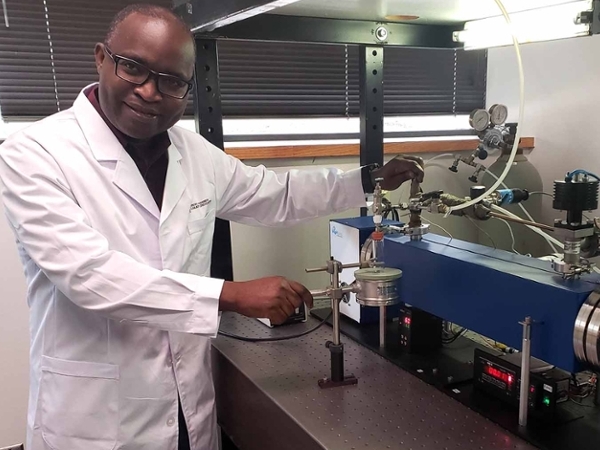LU professor receives significant grant for research
The American Chemical Society awarded Sylvestre Twagirayezu, assistant professor of chemistry, a $70,000 grant to develop an advanced analytical technique that could have a tremendous impact on the Southeast  Texas petrochemical industry.
Texas petrochemical industry.
The ACS’ Committee on Petroleum Research Fund awarded the highly-sought after and competitive grant for Twagirayezu’s research proposal titled, "Spectroscopic Studies and Chemical Dynamics of Small Polar Impurities in Petroleum Mixtures."
“This grant is an excellent boost to our research projects here at Lamar University and indeed a seed to my academic career,” said Twagirayezu. “It also serves as a ‘welcome’ to a larger community of chemical scientists, and my research group is pleased to be counted in.
Twagirayezu’s research addresses the strategic need for a fast and cost-effective analytical technique for determining the nature and distribution of low-concentration polar compounds contained in petroleum feedstocks. These polar molecules often poison the expensive rare-metal catalysts using in refining processes and degrade the refined products. His work provides a fast, sensitive and accurate method based on Molecular Rotational Resonance, an emerging spectroscopic method, for the detection of such impurities in petroleum products. The development not only benefits the refining processes and product quality, but can also be implemented for the detection of oil spills caused by unmanned wells in the remote regions. Furthermore, understanding in the chemical natures of these relatively small polar species in petroleum provides critical knowledge in kinetic modeling of combustion processes.
“The unique goal is the ability to probe and understand the fundamental nature of petrochemical reactivity in the presence of small thermally-energized polar impurities,” said Twagirayezu. The research begins this summer.
While the research will likely improve petrochemical products and the environment, Twagirayezu says the grant will strengthen LU’s existing research capabilities based on MRR technology, encourage interdisciplinary collaboration among LU faculty to work on projects that could lead to new breakthroughs in instrumental analysis and provide opportunities for training for the next generation of young scientists.
“Participating students will gain a solid background in chemical and physical science and develop practical skills in instrumentation and quantitative analysis of complex systems,” said Twagirayezu. “These students will be exceptionally well-equipped to enter the technology-based industry and possess the cross-disciplinary skills needed to address the technological and scientific problems of modern society.”


